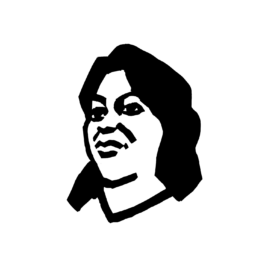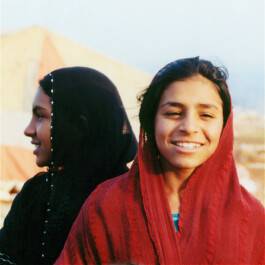
Episode 5:
Why have the Gypsies lived in Jerusalem for over three centuries yet still lack citizenship — and why do so few people know about them?
3 facts about Dom people

Photo from Dom Research Center
1. Over a thousand years ago, the "Gypsy" people began migrating from India. Those who settled in the Middle East and North Africa are called Dom, while those who went to Europe are known as Roma. Besides Arabic, they speak the Domari language, an endangered Indo-Aryan spoken language.
2. Historical evidence of the Dom in Israel dates back to the mid-18th century when German pilgrims and other European travelers reported encounters with “Gypsies”.
3. Today, the Dom community in Israel is estimated at around 5,000 people, with about 1,200–3,000 residing near the Lion’s Gate of Jerusalem. They are among Israel's most marginalized national communities. Amoun Sleem founded the Domari Community Center in Jerusalem to support children in their studies, prevent school dropouts, and provide women with job training opportunities.
Where and when you were born?
— I come from the Domari, or “Gypsy” community. I was born and lived my whole life in Jerusalem. Five generations of my family lived for almost 200 years in the same house in the old city of Jerusalem near the Lion's Gate. All these years our community was discriminated against and rejected.
Since my childhood, I could not understand what was wrong with us, what was wrong with being a “gypsy”. In school, in the streets, and in the neighborhood, everybody pointed at us, and nobody accepted or respected us and our culture.
Are there many Dom people in Israel and what is your legal status?
— There are around 2000 or 3000 people right now in Jerusalem. And there were more than 12,000 gypsies living in Gaza, but now we don't have any information about them now. In Israel, we are residents, but not citizens.
You said you come from the fifth generation living in Israel. Even the generation of your children don't have citizenship?
— No. Only residents.
What was your family like?
— I have five brothers and four sisters. I'm number seven. My mother passed away when I was a kid. Father had a very simple job, like most people in our community. He was a guard at the gate of one of the buildings in the old city.
The teacher always pointed out to us and said we were dirty gypsies. This was also the reason many gypsy kids drop out of school at an early age. And so did I.
What school did you go to?
— It was an Arabic school. The teacher always pointed out to us and said we were dirty gypsies. This was also the reason many gypsy kids drop out of school at an early age. And so did I. If you are always punished for no reason, and teachers humiliate you in front of all the students, of course, you would not want to come back. At about 10 years old, I decided to leave school.
My father was OK with it: if you want to learn or you don't want to learn, it's your choice.
How did they know you were gypsies?
— It’s the color, we are very dark, similar to the Indians.
The tourists treated us very nicely and kindly, and I was happy to make some money. That's how I learned English — I picked it up from the streets.
What did you do when you drop out?
— Running after tourists and selling them postcards. I was a kid, running away from my sadness to find something fun. The tourists treated us very nicely and kindly, and I was happy to make some money. That's how I learned English—I picked it up from the streets.
At about 13, I realized that there was no future in such a life. My parents couldn't read or write, and I didn't want a life like theirs. So, I got back to school. I thought, okay, it's a couple of years, and then I'm moving to high school, and hopefully it will be over with pain and feeling lonely.
But I discovered wherever we go, we are not the kind of children that any school loves to have.
So, from seven kids, only me and my sister finished school. She is a nurse now in a good hospital.
At 18 I started to learn to get my driving license. For gypsy girls, these things were forbidden, but I did it. I was smart. I passed my test from the first time.
What did you do after you finished school?
— I studied hospitality management. My father did not have money to give me for college. So when I was in high school, I started to work as a cleaner in a guest house for Dutch people. I was very proud that at such an early age, I can get money, study, and help my family. I felt kind of successful.
This success made me want to do something that nobody else had done before. At 18 I started to learn to get my driving license. For gypsy girls, these things were forbidden, but I did it. I was smart. I passed my test from the first time.
Maybe I'm not accepted by men. Maybe some women in the community also don't like me, or maybe they are jealous. But if jealousy is what can make our women start moving—"if she can do it, I can do it"—I'm also happy!
How did you come up with the idea of the Domari community center, that you created?
— At work, at first I was hiding that I was a gypsy because I was afraid they could kick me out. I said I was Arab, I wanted them to feel secure. I was working with them for 12 years, and they discovered it later. And they started to like me more when they discovered I was a gypsy.
When I started to work in the guest house and earn money at 15, I felt I was independent. I wanted to do something for my community. I was hoping to be like Oprah — to be a hero.
I started helping children who were dropping out of school. I taught them the alphabet, reading, and writing. I have a garden, and I put tables and chairs in it. They could come on Saturday and Sunday for a full day when I was free from my work.
And then the ideas grew. I found the money. There are good people who believe in my goal. In 2000 we officially got papers that we are a nonprofit organization Dom Research Center. I've been running it for almost 24 years. I'm not famous or rich, but with how much struggle I was going through in my life to run this center and not give up on my goal and my dream — I'm satisfied with myself. I'm very grateful and very proud of myself.
Maybe 20 years ago, if you looked for information about gypsies in Israel, it was hard to find something about us. But now, there is so much material on Google! Some of it is negative and some positive. I don't care. The main thing is that people know gypsies exist in the Holy Land and they've been here for hundreds of years. And if you look for us, you will find us. And the education level in the community is growing slowly, but it's growing.
What work do you do in the Center, besides spreading information about your community?
— We have tutoring classes for children. They get support with their homework and studies. We hire teachers for mathematics, Arabic and English. And sometimes we're getting international volunteers to help children with homework. The parents of these children can not help them, they don't read or write, and they don’t give them time and space to study. If the child doesn't do his homework, and he is not able to do what the teachers ask him — he will not come to the school. But if you have done your homework, you are ready for tomorrow to go to school and do what the teacher asks you — you will go with confidence. So we build the confidence inside the children. This program is about the future for the new generation.
We also give courses for women who cannot read or write—we teach them manual work, like hairdresser, manicure, cooking.
Do you also teach them to read and write?
— No, we tried several times, but they don't have the will to read the ride. They are very poor and have kids, and they just need to earn money. So, we needed to find something fitting with their situation. They really have the will to earn money, change their future, and be a good example for their children.
Men were scared of me. Too independent, a troublemaker. So nobody wants to get close to me, and I accept it.
Do you have your own kids?
— No. I'm not married. I'm independent. And I don't think a man is everything in life. So it's okay. In our community it is unusual. Because we have marriages at a very early age. When I was 15, 16 there were men that I could marry. But I refused them. And my father didn’t force me. I was very blessed to have this kind of freedom — to do whatever I wanted. Of course, if I could find a man who could understand me, and understand my goal, I might get married. But most of the men think I am out of the culture. Men were scared of me. Too independent, a troublemaker. So nobody wants to get close to me, and I accept it, you know.
I have nephews and nieces. Most of them are in school. We have the first lawyer in the family — she is my niece, and I helped her with her education! This is what makes me happy.
Text Asya Chachko
Illustration Victor Melamed
Special thanks to Pavel Bernstein
more episodes
© 2017–2024 Made in Tel Aviv with love. Email Us, Follow on Facebook